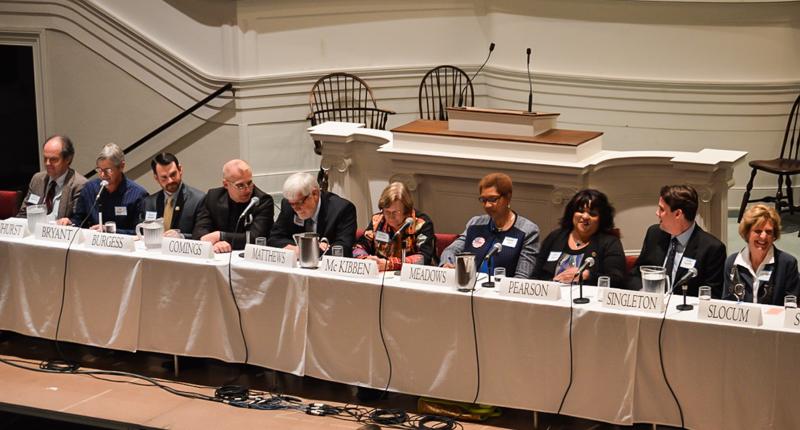Candidates Address City Council Priorities
City Council candidates address a crowd of over 100 people at the Oberlin Community Candidates Night at First Church in Oberlin. Fourteen candidates are competing for the seven available seats on the City Council.
October 30, 2015
City Council candidates crammed onto a small stage to field questions at the Oberlin Community Candidates Night at the First Church in Oberlin last Monday. Fourteen contenders addressed the most pressing issues for next term’s Council members in the hopes of procuring one of the seven available seats.
“For the Council, [Green Acres] has got to be one of the top priorities for the next group,” said David Ashenhurst, who sat on City Council from 2006 to 2009, in response to moderator Alan Mitchell’s question about what the City Council’s priorities should be aside from deciding how to proceed with Renewable Energy Credits.
RECs have become a hot-button issue for City Council hopefuls this campaign season. Oberlin’s green-energy investments resulted in an $800,000 rebate to the city, and candidates are split on how they want to use that money in the future. Options include a pro-rata return to the various ratepayers or investing in further citywide green initiatives, according to the League of Women Voters of the Oberlin Area.
“The City must return the over-recovery of wholesale power costs to the ratepayers,” said Scott Broadwell, City Council president, in a statement for the LWV voter’s guide. “The ratepayers should be allowed to make their own decisions about how they wish to spend their over-recovered funds.”
Broadwell was not present at last Monday’s event due to an injury. Council member Kristin Peterson, who is not running for reelection, was also missing from the stage. Their absences made room for more newcomers to voice their opinions about how the City Council should focus its energy next term.
“Council could do more to reach out to youth,” said David Sokoll, OC ’10, by far the youngest of the 14 candidates. “Part of that would be outreach to the community and finding new ways to engage people.”
Job creation and local economic development permeated each candidate’s campaign, especially when addressing the question of what City Council’s role should be in helping its most vulnerable, low-income citizens. The 2010 United States census showed Oberlin’s poverty rate at 20 percent.
City Council Vice President Sharon Fairchild-Soucy echoed Sokoll’s concerns regarding youth engagement and unemployment in Oberlin. Soucy said that the City Council needs to focus on three major areas to help both young and low-income people: creating more local jobs, developing affordable housing and raising the minimum wage.
Others approached the issue of economic sustainability with establishing a better public transportation system. Council member Sharon Pearson argued that focusing on public transit, along with more job trainings and opportunities, could help alleviate the high level of poverty in Oberlin.
“There are low-income people who are looking for affordable, suitable housing,” Pearson said. “Social justice gets the short end of the stick. With that regard, I think we need to focus on local jobs and training and public transportation.”
Candidates also stressed the importance of increasing transparency between the Council and local residents. City Council member Ronnie Rimbert said that facilitating communication between the Council, administration and residents is the most important function of a Council member.
Issues that also recieved extensive coverage were creating a water-utility plan, improving the City’s infrastructure, finishing the Green Acres project and helping local businesses.
Voters will have the opportunity to select the seven candidates who will serve a two-year term on City Council on Election Day this Tuesday, Nov. 3.

















